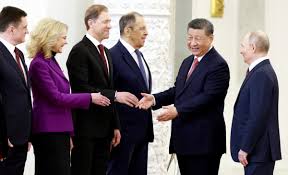UK-EU youth mobility scheme key to better EU relations, says top diplomat

Brussels: Keir Starmer’s efforts to reset Britain’s relations with its European allies is contingent upon a UK-EU youth mobility scheme, a top diplomat has indicated.
Miguel Berger, Germany’s ambassador to the UK, said stability across Europe could be undermined if the allies could not secure a number of “clear measures” that demonstrate the “concrete advantages” of their relationship – one being the youth mobility scheme.
While Berger appeared to accept the pressure Starmer was under from Eurosceptics and Brexit supporting newspapers in the UK, he said the scheme was ultimately “quite simple”.
“The most important thing is [that] people who come here will go home after that. So the idea is really to have the experience, but then go home,” he told the Guardian.
“It should be quite simple. But there are visible attempts to portray this as migration, or to portray it as freedom of movement.”
A poll conducted by YouGov for the European Council on Foreign Relations found almost seven in 10 Britons, including a 55% majority of former pro-Brexit voters, would support a scheme that would allow 200,000 18- to 40-year-olds from the UK and the EU to travel, study and work freely in each other’s countries for up to four years.
When asked if the prime minister’s willingness to join the youth mobility scheme would mark a successful reset for him in showing how far he would go to improve cooperation, Berger said: “I think it is an important element. Another one is the Erasmus scheme. All of that, at least for us, is really, really important.”
Berger noted that ultimately it should be the responsibility of British officials to highlight the advantageous elements of this reset in relations, but he criticised those attempting to mislead the public on what the scheme actually means.
“We also see, looking at social media and some papers, that there is an attempt, obviously, to portray things in the wrong way.”
Before Christmas, the Conservative leader, Kemi Badenoch, criticised the prime minister for planning to “give away our hard-won Brexit freedoms”.
Starmer gave his last interview before Christmas to the Sun, and when asked about the mobility scheme, he said: “I’ve been clear from the get-go that freedom of movement is a red line for us, and no plans in relation to free movement on any level, but we’re entering into discussions.”
Despite this, the diplomat maintained that the scheme had “nothing to do with reversing Brexit. It respects all the red lines. And it’s simply trying to see where are areas, where it’s in our mutual interest to work more closely together.” He added“: “I’m confident we will find a solution.”
Berger’s comments follow what officials believe have been a successful six months in reaching out to European allies, given the progress the UK and Germany have made on “concrete projects” including the Trinity House defence pact.
The bilateral treaty could have been signed before the German elections, Berger said, but noted, “we need a new government that will work on its implementation over the next few years, which is why it’s better to wait”.
He also made a point of noting that politicians from the Conservative Christian Democratic Union of Germany party have already made visits to see UK officials to mark how important they take Germany’s partnership with Britain.
For Berger this is important given the two Nato allies, who appear to be aligned on the security of Ukraine, face an important task in engaging with the US administration and Russia to ensure peace in Ukraine.
“The challenge for the British government, Germany and for all of us will be to talk with the new US administration about how to engage Russia.”
Echoing the comments Starmer made at a foreign policy speech in December, Berger said: “We want to see that Ukraine is at the table of negotiations. We want Ukraine to take the leading role. We will think about how to strengthen Ukraine, but this will then depend, obviously, also on the new American government.
“And at the same time, because this is so important for our security in the next 15 to 20 years, so we must make sure that the main European countries are also at the table.
“So that means the United Kingdom, countries like Poland, France, Germany, we all need to have a say in that, because if the outcome is not the desired one, it will impact our security.”
Starmer is to meet EU leaders in an informal summit next month, the first invite the UK has received since the bitter battle of Brexit.
Berger’s comments appear to signal that Starmer may have to agree to some concessions like youth mobility in order to secure economic benefits, such as on EU trade.





